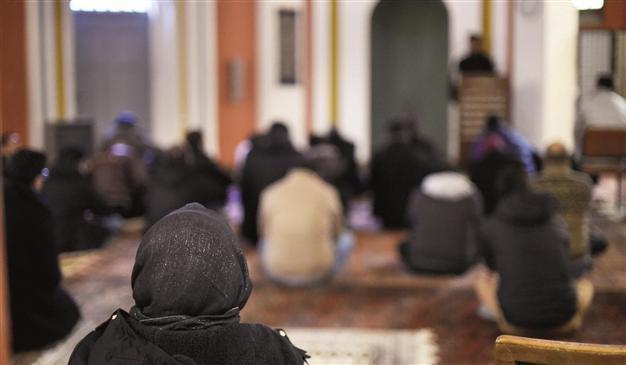Merkel’s bloc accused of ‘anti-immigrant’ sentiments
BERLIN – Anadolu Agency

Muslims in Germany pray during the Friday prayer at a mosque of the Lahore Ahmadiyya Movement for the Propagation of Islam in Berlin. AFP photo
German opposition parties have accused Chancellor Angela Merkel’s Christian Democrat bloc of creating an anti-immigrant political climate that has resulted in a growing number of attacks on buildings housing refugees.“As mainstream political parties start to make racism socially acceptable, violent right-wing gangs feel encouraged,” Bernd Riexinger, chairman of the Left Party told daily Leipziger Volkszeitung on Dec. 13.
Three buildings, which were to host refugees in the southeastern German town of Vorra, were burned down on the night of Dec. 11 in what police suspect was an arson attack by neo-Nazis. The perpetrators painted swastikas on the wall of a nearby building. The Bavarian police tasked a special team on Dec. 13 to identify the perpetrators.
Riexinger criticized Merkel’s Christian Democratic Union (CDU) and its sister party the Christian Social Union (CSU) for adopting an anti-immigrant rhetoric and not clearly distancing themselves from the recently formed anti-immigrant and anti-Islam movements that have seen growing support.
“The Christian Union parties are openly expressing an understanding for the xenophobic demonstrations,” Riexinger said.
Recently formed right-wing and anti-Islam platforms like PEDISA and HOGESA have gathered thousands in protests organized in cities such as Dresden, Hannover and Cologne in the last two months.
Patriotic Europeans against the Islamization of the West, or PEDISA, has started weekly rallies in Dresden in October, with the participation of nearly 500 demonstrators.
In its latest demonstration on Dec. 8, some 10,000 protestors rallied, chanting anti-immigration and anti-Islam slogans.
Several leading politicians from Merkel’s Christian Democrat bloc have criticized right wing extremists, but also argued one should address the concerns and fears of others who are joining in these demonstrations.
Anton Hofreiter, the parliamentary group leader of the opposition left-wing Green Party, has particularly criticized Merkel’s coalition partner CSU for contributing to an anti-immigrant climate in the past weeks and months.
“The recent suspected right-wing arson attack on refugee houses in Worra should shake the CSU awake,” he said on Dec. 13, warning the party against drifting into right-wing populism.
The CSU has long been critical of immigration and accused many asylum seekers coming from Balkans and immigrants from Bulgaria and Romania of exploiting the social benefits available in Germany.
The CSU, which also rules the state of Bavaria, sparked a debate last week by its proposal to oblige immigrants to speak German both in public and with their families at home to encourage what was claimed to be “successful integration.”
Following widespread criticism, the CSU revised the text on Dec. 12 and argued those who want to live in Germany permanently “should be motived to speak German in daily life.” The motion was adopted on Dec. 12 at the party congress in Nuremberg.
At a party congress on Dec. 13, CSU Chairman and Prime Minister of the state of Bavaria Horst Seehofer repeated the successful integration line, saying: “Integration can only be successful when one is ready to learn and also practice the language of the host country.”
He also said there was “no place for religious extremism” in Bavaria, maintaining that the Bavarian administration would closely monitor the Salafist scene for the “protection of our people.”
Both Merkel’s CDU and its sister party feel threatened by the growing support for populist parties and movements.
With its anti-Euro and anti-immigration rhetoric, Germany’s first Euroskeptic party, Alternative for Germany (AfD), has seen growing support recently.
The party won seven seats in the European Parliament elections in May and entered state Parliaments in Saxony, Brandenburg and Thuringia during 2014.
Germany has witnessed a rise in anti-immigration and anti-Islam sentiments in recent months, raising worries among politicians.
A recent poll carried out last week by Germany’s public-service television broadcaster, ZDF, revealed a large majority of the German public has skeptical and negative attitudes toward immigrants.
Some 54 percent of Germans have criticized immigrants for not doing enough to integrate. Some 25 percent said immigrants were a disadvantage to Germany, while 45 percent of those polled said they were bringing both advantages and disadvantages.
Around 20 percent of residents in Germany have a migrant background, according to latest figures from the Federal Statistics Office.
About 9.7 million of immigrants have become German citizens, while 6.8 million immigrants have kept their former nationalities.
















